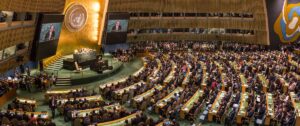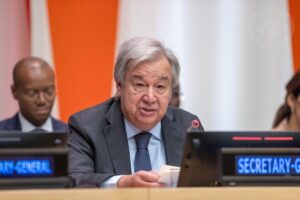Executive Summary
“It would be difficult to fix the present crises and prevent new ones with the same mentality and logic that led to their onset. Our challenges are clearly reinforcing each other. The best approach would be to seek systemic solutions and act across silos. … Concerning the Summit of the Future, it will be a major event in September 2023 as proposed by the Secretary-General in his Our Common Agenda report. … it will be one of the most significant undertakings of the UN, certainly the most important since Agenda 2030.”
—Ambassador Csaba Kőrösi, President of the 77th UN General Assembly1 Note: President of the General Assembly, “Vision Statement by Ambassador Csaba Korosi, Director at the Office of the President of Hungary, Candidate for the 77th President of the UN General Assembly”. 3. ; Coalition for the UN We Need. C4UN OCA Report On UN General Assembly Informal Interactive Dialogue with the 77th PGA candidate H.E. Mr. Csaba Kőrösi (Hungary). 3.
In 2022, the growing impacts of climate change have been felt across the globe, from prolonged drought in the Middle East and North Africa, to erratic monsoons in South Asia and record-breaking heat waves in Europe and China. At the same time, the COVID-19 pandemic—which reached the tragic milestone of one million deaths within the first eight months of this year—and the ongoing war in Ukraine and other violent conflicts have impeded global progress toward the Sustainable Development Goals. The global population affected by hunger rose to 828 million in 2021, a jump of 150 million since before the pandemic. While technological advances wield the potential to help tackle global inequities, the lack of an international framework regulating interstate relations in cyberspace leaves a crucial gap in the management of conflict across borders; equally alarming is the failure of the recent Nuclear Non-Proliferation Treaty review conference to reach consensus on a substantive outcome.
To address these and other pressing global challenges, UN Secretary-General António Guterres presented to world leaders one year ago his seminal report, Our Common Agenda. In addition to providing conceptual innovations—a new global deal, new social contracts, and networked, inclusive, and effective multilateralism—and a wealth of recommendations, he called for a “Summit of the Future” to improve governance arrangements in critical areas that urgently require more effective collective action worldwide; to rethink global cooperation in the face of growing global competition, uncertainty, and anxiety. Among the summit’s anticipated and potentially far-reaching outcomes are an overarching Pact for the Future, as well as a Declaration on Future Generations, a Global Digital Compact, and a New Agenda for Peace.
Convening the Summit of the Future next year, in September 2023, alongside the “SDGs Summit” would recognize the gravity of the issues now undercutting the SDGs’ achievement. It would further highlight the need for a more urgent and capable response by the world’s governance system to the rising risk of nuclear war and the growing realities of runaway climate change, resurgent poverty, and myriad threats to human rights. While the summit will not tackle the world’s most colossal problems overnight, it presents a rare, once-in-a-generation opportunity to achieve some high-profile wins in the next twelve months, in order to generate momentum and improve conditions for even more ambitious global governance innovations in years to come.
This report’s companion study, Road to 2023: Our Common Agenda and the Pact for the Future (June 2022), presents twenty main recommendations intended to encourage more ambitious, forward-looking thinking and deliberation on global governance renewal in the run-up to the Summit of the Future. Inthis report, we elaborate on three of the most promising of these recommendations, which build in turn on ideas introduced initially in Our Common Agenda. Each of them pushes the boundaries of our thinking about the essential elements of future global cooperation:
Declaration on Future Generations
Proclaiming the well-being of future generations as a global public good, a Declaration on Future Generations should be crafted with consideration of:
- Legal Rights of and Obligations toward Future Generations: Providing legal recognition to the well-being of future generations requires that a “duty of care” is made explicit to which Member States can be held accountable. Globally, the connection between human well-being, our natural environment, and human rights was made ever clearer in the recent, historic UN General Assembly resolution that declared access to a clean and healthy environment to be a universal human right.
- Realigning Political Incentives in Support of Future Generations: Realigning priorities and renewing intergenerational solidarity could be done through existing institutional mechanisms, such as evaluating the impact of UN resolutions on future generations (and then amending them as necessary) and strengthening national capacities for mainstreaming the interests and needs of future generations (including foresight-based national policymaking supported by forward-thinking legal, political, economic, and environmental research).
- Youth, Agenda 2030, and Beyond: The cross-cutting Sustainable Development Goals lay the foundation for thriving youth populations today and determine the opportunities they face as they grow into the adults of tomorrow. Such responsibilities towards young people must be inherent in a Declaration on Future Generations, as each generation must confront the challenges and opportunities of youth.
A repurposed Trusteeship Council or Stewardship Council, a Futures Lab, a universal periodic review mechanism and Intergenerational Sustainability Index, and a Special Envoy for Future Generations could all support the declaration’s implementation.
Global Digital Compact
Rapid advancements in technology pose ever increasing risks to the protection of human rights, even as they create opportunities for development. The absence of a holistic, networked, and multilateral approach to technological governance necessitates a Global Digital Compact based on a framework that addresses three key dimensions of the technological lifecycle (the “3-I’s”):
- Innovation: Ensure that technological development, from ideation and sourcing to creation and deployment, strives to promote public interests, safeguards environmental sustainability, and adheres to basic human rights norms.
- Infrastructure: Foster universal access and connectivity to technological infrastructure and the Internet; adherence to Agenda 2030 also means that such infrastructure should be environmentally sustainable and secure.
- Information: Verify that the development or ownership of technology does not adversely impact human rights and confirm that human rights apply equally online.
New Agenda for Peace
The spirit of the original, 1992 Agenda for Peace can be recaptured by a new and dynamic approach to sustaining peace, and promoting a mutually reinforcing approach to justice and security in the twenty-first century, that focuses on:
- Prevention: Reinvigorated conflict prevention at local, regional, and international levels could prioritize new foresight capabilities, an enhanced political role for UN Resident Coordinators, a new Peacebuilding Commission audit tool, and disarmament.
- The Changing Nature of Conflict: Climate change and water security, cyber-warfare (including disinformation and misinformation), and the two-way interplay between sustainable security and a healthy global commons all merit special attention.
- Inclusiveness: Innovate the Women, Peace & Security and Youth, Peace & Security agendas through targeted investments in education and a policy opportunity approach that transforms the violence of exclusion into trust and partnerships.
- UN Collective Security Architecture reform: Strengthen the Security Council, General Assembly, and Peacebuilding Commission, and adopt the Secretary-General’s proposed Emergency Platform, through membership reconfigurations, new tools, and new modes of non-traditional engagement with regional organizations, local organizations, and non-state actors that contribute to peacemaking, peacekeeping, and peacebuilding.
Road to the Summit of the Future
Each of the three global policy frameworks proposed above would benefit from the formation of a task force or committee, led by one UN Permanent Representative from the Global North and one from the Global South, placed under one of the Pact for the Future’s proposed thematic pillars, and given the requisite UN Secretariat support. Independent research should also be commissioned from academics and policy researchers to inform the task forces’ work, and the substantive inputs and perspectives of other diverse actors across civil society should be sought.
Given the sheer complexities, the large number of policy issues to be deliberated upon, and the accelerated time frame for the Summit of the Future, civil society groups could play a constructive role in the finalizing of ambitious goals within the Pact for the Future and associated policy frameworks. Meaningful civil society engagement, in the spirit of more networked, inclusive, and effective multilateralism in the summit’s preparations, can reassure all stakeholders that decisions taken in September 2023 are well-informed, enjoy broad social ownership, and generate a sense of co-responsibility in supporting their implementation. Such collaboration could include:
- Ensuring that the intergovernmental negotiations both welcome and deliberate on substantive inputs provided by scholars, non-governmental organizations, major groups, business leaders, and parliamentarians.
- Opening formal negotiations to public observation.
- Supporting national, regional, and global multistakeholder forums in the run-up to the summit.
- Encouraging the involvement of civil society and parliamentarians in the national delegations preparing for the summit.
The aspirations of billions worldwide grow in favor of change toward a system of global governance that values cooperation over discord, global policy based on scientific evidence over fragmentation and disinformation, and, most of all, the embrace of human dignity and a rich notion of positive peace, where all peoples and nations have the opportunity to live in free, safe, and habitable societies in harmony with both nature and their neighbors—now and in the long term. But without the reforms we need mobilized through a high-ambition coalition of states, businesses, and civil society partners, “the future we want” will soon be out of reach for us and lost to posterity for good.
Notes
- 1Note: President of the General Assembly, “Vision Statement by Ambassador Csaba Korosi, Director at the Office of the President of Hungary, Candidate for the 77th President of the UN General Assembly”. 3. ; Coalition for the UN We Need. C4UN OCA Report On UN General Assembly Informal Interactive Dialogue with the 77th PGA candidate H.E. Mr. Csaba Kőrösi (Hungary). 3.




